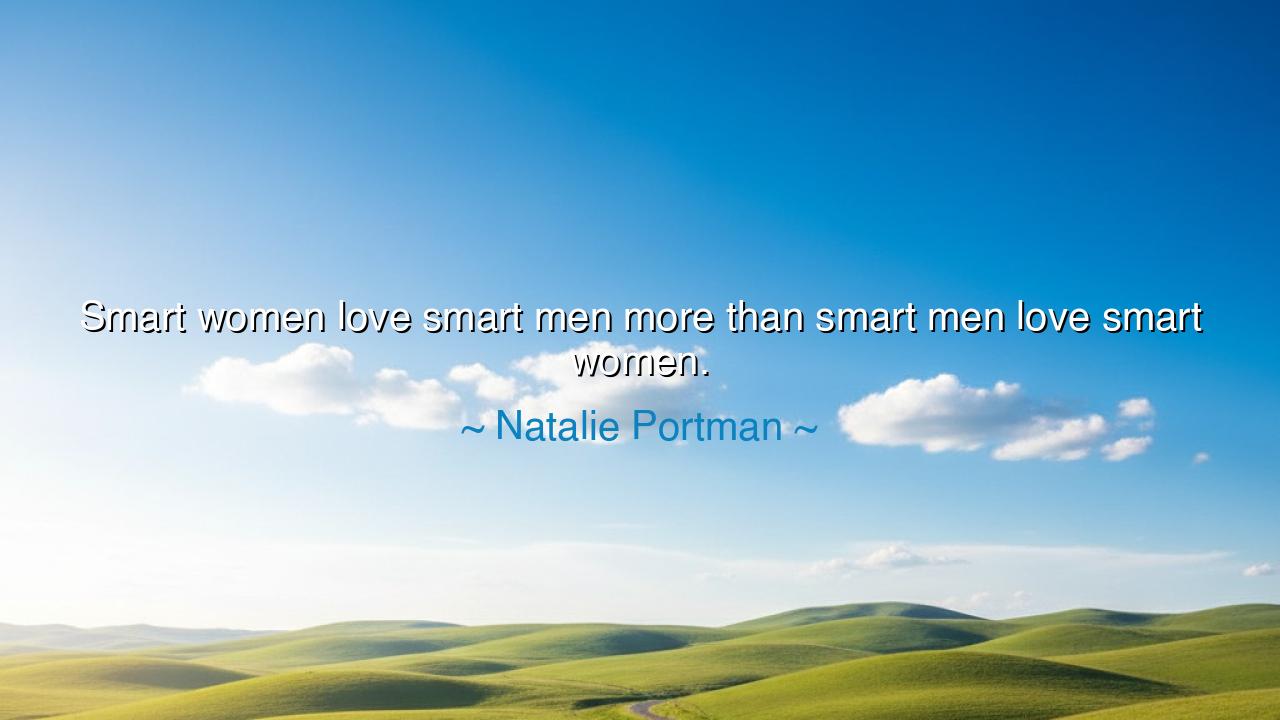
Smart women love smart men more than smart men love smart women.






In the thoughtful and incisive words of Natalie Portman, we encounter a reflection that pierces into the delicate balance between admiration, intellect, and desire: “Smart women love smart men more than smart men love smart women.” Though spoken in the modern age, this statement carries the resonance of an ancient truth — that the dance between intellect and affection has never been equal, that society has long taught men to fear what women have always embraced: the power of the mind. Beneath her words lies a quiet ache and a powerful recognition — that for many women, intelligence is not a threat but a source of love, while for many men, it remains a mirror they struggle to face.
To love intelligence is to love the spark of thought, the daring of curiosity, the fire of understanding. When a woman of intellect finds her equal, she does not seek to outshine him, but to rise beside him. Her admiration is not servitude but kinship; her attraction is not submission but resonance. The smart woman, in Portman’s words, yearns not for flattery, but for partnership — for the meeting of minds that gives rise to something greater than either could create alone. But the world has often been cruel to such women, for it has taught them that their brilliance must be softened, their voices tempered, their light made smaller to be loved. Thus, Portman’s statement reveals not cynicism, but lamentation — that women are taught to celebrate intellect in others, while men are too often taught to compete with it.
The origin of this imbalance is ancient and cultural. For centuries, power has been entwined with masculinity, and intellect has been considered a crown reserved for men. The ancient Greeks exalted philosophers like Plato and Aristotle, yet seldom allowed women into their academies. Even when a woman of wisdom arose — like Hypatia of Alexandria, the philosopher and astronomer who taught male scholars in the 5th century — she was persecuted, her brilliance seen as defiance rather than virtue. Hypatia’s story reminds us of what Portman’s words reveal: that the world has long feared a woman whose mind could rival or surpass a man’s. She was murdered not for her sins, but for her strength, because she embodied the idea that intellect belongs to no gender — and that truth unsettled those who ruled by hierarchy, not by understanding.
Natalie Portman, herself both scholar and artist, speaks from the crossroads of experience — a woman educated at Harvard, a thinker amid fame, navigating worlds that often demand beauty before intellect. Her observation reflects the reality that even in the modern age, women’s intelligence can be praised in theory but resisted in intimacy. A man may admire a woman’s wisdom from afar, but up close, he may feel his pride tremble before her clarity. The smart man, though taught to conquer, is rarely taught to admire without insecurity. The smart woman, however, has long been taught to love upward — to see strength in intellect, not to fear it. Thus, her love flows more freely, more deeply, unburdened by the need to dominate.
There is also a spiritual truth in Portman’s words — a truth about the nature of love itself. True love is the meeting of equals; it thrives not on hierarchy, but on harmony. When intelligence is seen as a threat, love becomes small and fearful. But when it is cherished as beauty — as something divine — love expands. The woman who loves intelligence loves not power, but light — the light that reveals, challenges, and transforms. The man who fears intelligence fears not the woman, but the reflection of his own limits. Thus, Portman’s quote is not a condemnation, but a call — for men and women alike to grow into love that celebrates equality of mind as much as of heart.
History offers examples of what such love looks like. Abigail and John Adams, the early American intellectuals, shared a marriage rooted in mutual respect and mental partnership. In their letters, one sees the beauty of two great minds in dialogue — debating politics, philosophy, and morality. John once called Abigail his “best, dearest, worthiest friend.” Their union was not of dominance, but of shared intellect, proving that the meeting of minds can be the truest form of romance. Such partnerships, though rare, are possible when love is built not on fear, but on admiration and humility.
The lesson, then, is clear: to love wisely is to love the mind as much as the body. Seek partners who challenge your thoughts, not just flatter your ego. Let love be a space where intelligence is nourished, not silenced. If you are a woman, never dim your light for comfort. If you are a man, learn that a woman’s wisdom does not diminish your strength — it refines it. In the temple of true companionship, both minds must stand side by side, each illuminating the other.
So remember, O listener, the wisdom in Natalie Portman’s observation: that love, when ruled by fear or pride, remains shallow — but when founded on equality of mind and soul, it becomes eternal. The smart woman’s love is not lesser for its depth; it is the blueprint of what love was always meant to be — brave, curious, unafraid of truth. Let us learn from her, and from Portman’s words, to build a world where intellect is not gendered, and where love itself becomes the union of two radiant minds seeking understanding together, forever walking hand in hand toward the light.






AAdministratorAdministrator
Welcome, honored guests. Please leave a comment, we will respond soon